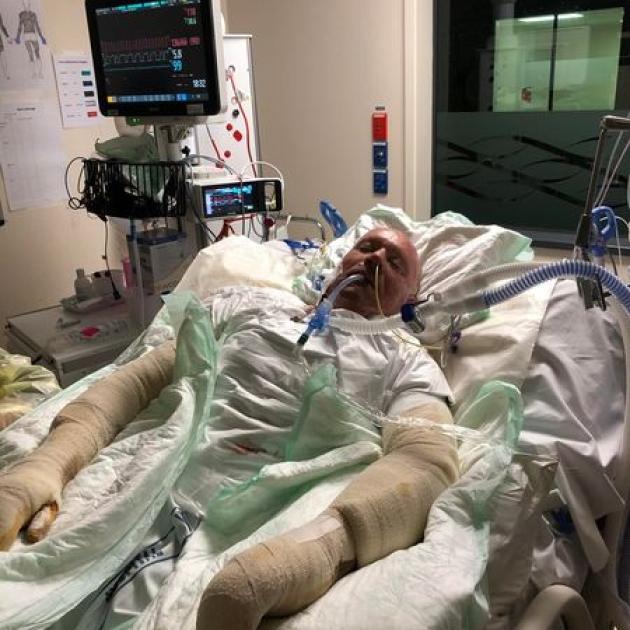
Kevin Burney, 61, marked one year in April since the accident, which resulted in burns to 70 percent of his body.
As part of his post-hospital recovery, Burney needs bilateral release surgery on both elbows to restore movement in the joints.
Until he has the surgeries, Burney can not lift his arms above his head and needs help with basic tasks such as getting dressed, combing his hair and shaving.
The first surgery was initially planned for January, with the second to follow. This would have enabled him to return to his job as a printer in Christchurch this month.
However, the surgery has been continually rescheduled and Burney is still waiting.
The latest date he has been given is August 14.
He said his printing job was “reasonably physical”. His employer told him about one month ago they would no longer be able to keep his position open, as they have done since the accident, and would be getting someone else to do the job.
“They are a brilliant company, they have been really good to me, I can’t complain about them,” Burney said.
“I was planning to return to work, and we had already established with the company dates for that. But there’s no way that could ever happen given the delays in the health system,” he said.

“I’m over 60 now, it’s difficult to train in a new career. I will be close to 62 before I’m really back up to work speed again.”
While he blamed the health system for his predicament, he was also philosophical about it.
“I do feel let down but also, listening to all the discussion on talkback and what have you, mine definitely falls in the category of non-urgent, it’s not life threatening. I feel good to allow other people who have more urgent needs to get in (for surgery).”
Recent delays to a surgery date had been due to not being able to confirm a bone surgeon, but that was now confirmed.
In the face of the surgery being rescheduled earlier this year, Burney had opted to have both operations done together to condense his healing time so he could get back to work quicker.
However, now returning to his job was not an option, he was hoping to go back to “plan A” of having the two surgeries separately, as this would be less physically traumatic.
He was waiting to hear back from his medical team about whether he could do this.
Burney suffered burns to 70 percent of his body when a metal drum he was using a grinder on in his driveway exploded in flames on April 2 last year. He was rushed to Christchurch in a critical condition, and airlifted to Middlemore Hospital in Auckland.
The first four weeks were in intensive care, where doctors said they had not seen burns as severe since those they treated from the deadly White Island eruption.
They did not know whether Burney would survive as he battled for his life. One of his lungs collapsed, he suffered an infection, and his heart stopped during surgery.
Burney’s family were overjoyed when he made enough progress to be taken out of intensive care, moving to the hospital’s specialist burns unit on April 30.
He spent eight weeks in the burns unit, undergoing several skin graft surgeries. The surgeries were nine-hour marathons involving three surgeons, where skin was taken from unburned areas of his tummy and buttocks, to be grafted onto the burned areas of his torso, arms, hands, and the front and back of his thighs.
Burney said overall he and wife Amanda felt positive about his recovery, which was being aided by district nurse visits three times a week to reapply dressings, and a physiotherapist visiting twice a week.
Te Whatu Ora would not discuss Burney’s situation with The Star yesterday, saying it doesn’t comment on individual patient care.
A spokesperson said theatre capacity in Canterbury is currently reduced to match the available anesthetic technician workforce and ensure safe surgical care.
“Surgeons in Christchurch are having to prioritise patients waiting for surgery every day, with only the most urgent cases going ahead and some patients have had to be deferred at short notice”.













